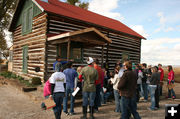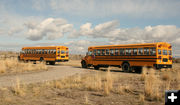
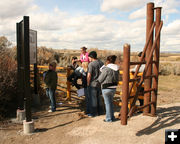
Interpretive sign
Sommers Ranch homestead Teacher Tracy Hughes and some of her students read the interpretive sign at the Sommers Ranch homestead. The homestead is being developed as a living historical site to interpret the homestead era in the Upper Green River Valley, between 1907 to 1957. The site is on the National Register of Historic Places and is a Wyoming Centennial Ranch. It is being managed cooperatively between the Sublette County Historical Society, Green River Valley Museum, and siblings Jonita and Albert Sommers.
|

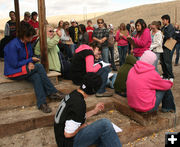
Talking about homesteading
Jonita Sommers (sitting, with green coat) explains interesting details about local homesteading and tie hacking history. Jonita's family has been on this ranch for over 100 years. The old 2-story log homestead house was used until the 1970s. For the last years it served as a bunkhouse for the hay crew. The family has donated an acre of land and many of the old ranch buildings to be a part of the homestead living history site. It will be a place where people can touch things, learn how they worked, and do fun experiments to learn how things were like for the people who lived during the homestead time period.
|

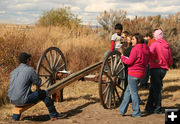
Teeter-Totter
Students try out the homestead teeter totter. This has been rebuilt from the original which was used by Jonita and Albert Sommers on the ranch in the 1960s. It uses tractor seats for sitting and broom handles to hang onto. The supports are wagon wheels and axle from an old wagon. The homestead playground includes a swing and a basketball hoop. Eventually a wagon wheel merry-go-round will be added. The homestead is a living history museum that attempts to give people of today a look at how families lived, worked and played on a ranch in the early 1900s in the Upper Green River Valley.
|

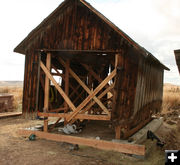
Restoring the garage
Workers are carefully attempting to restore the old homestead garage. Part of the challenge has been to lift the leaning building up so a new foundation could be poured. Once the foundation is stabilized, they will attempt to restore the exterior walls which are rotton on the lower edges. Each step is a technical challenge to stabilize the aging building and preserve as much as possible of the old structure.
|

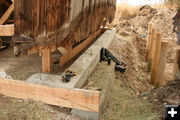
Foundation
The historic old garage is getting a new foundation and then work has to be done to restore the rotted side wall of the building.
|

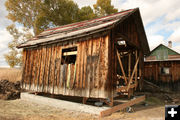
Old garage
The garage has been raised off its foundation slab so a new concrete foundation could be poured. When finished, the building will be raised a couple of inches to resolve some water drainage issues around the building which has caused the lower boards to deteriorate on the historic buildings.
|

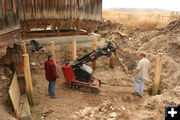
Cellar work
Workers have dug out the old root cellar and are placing wall supports. Eventually walls and a roof will go on. The interior will have shelves for food storage. The top will be covered with a mound of dirt. The constant cool temperature in the cellar served to keep food cool for long-term storage during the year.
|

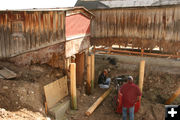
Cellar
The old cellar is being rebuilt. Access was through a door in the building above and walking down steps into the room buried under a big mound of dirt. Once reconstructed, plans are to hold experiments to see what the temperatures were and do living history projects in food preservation compared to modern conveniences like refrigerators.
|

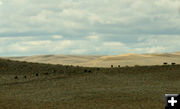
Drift cattle
Green River Drift - cattle ranching history Cold weather of the late fall causes cattle that have been grazing on allotments on the National Forest in the Upper Green to come down out of the mountains and work their way along fencelines to collection points. This is called the Green River Drift. Ranchers than sort the cattle by brands and take them to their respective ranches.
|

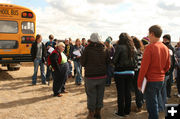
Talking about the Drift
Area ranching history Local rancher and historian, Jonita Sommers talks to the students about the history of the Green River cattle drift, which has been taking place for more than 100 years in the Upper Green River Valley. Her family ranch has been a part of the Drift during that time period, and still is today. Jonita wrote a book about the Green River Drift. Efforts are underway by the Wyoming State Historic Preservation Office to designate the Drift path on the National Register of Historic Places.
|

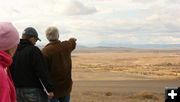
Rendezvous Grounds
Fur trade era history Students look over the valley of the Green River, which is the site of six of the 16 historic Rocky Mountain fur trade trapper rendezvous of the early 1800s. Also, off in the distance, is the location of Fort Bonneville, a short-lived fur trapping post built in 1832 by Captain Benjamin Bonneville on the banks of the Green River.
|


Rendezvous Grounds
Six of the 16 Rocky Mountain fur trade rendezvous were held near Daniel, Wyoming between 1824 and 1840. It was a time when the mountain trappers got together with the supply wagons to trade beaver furs for supplies. The valley below would have been a scene with camps of hundreds of trappers and thousands of indians who came to meet the supply wagons from the east. The later rendezvous lasted for weeks, with legendary stories of their escapades documented in trapper's journals.
|

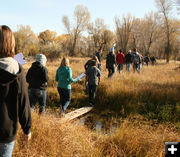
Going to the island
Lander Trail - New Fork River Crossing historical park Students cross a makeshift board bridge across a wet swale on the way to the island at the New Fork Park. The property for the 82-acre historical park was acquired in 2010 as mitigation for activity in the Pinedale Anticline gas field and is just beginning to be developed. Work yet to be done includes putting in walking paths, interpretive signs and a parking lot. These students got the first tour of a new planned trail route to get over to the island where immigrant wagons crossed the New Fork River. Eventually a better walking bridge will be installed at this location. The park will have walk-in access only.
|

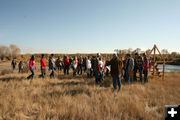
The Island
Students gather at the location on the island in the middle of the New Fork River that is believed to be very close to the spot where emmigrant wagons crossed 1859 through 1869. Many diary accounts describe details of the river crossing, which was often difficult and dangerous during high spring runoff which swelled the river to full bank rapid flows. Part of the challenge of telling the story of this site will be countering the present-day serenity and recreacting the image of the hustle and bustle of hundreds of wagons crossing the river a day during the peak emigration months of the Oregon Trail migration time period.
|

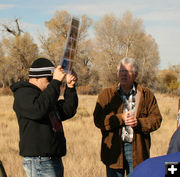
Old bullets and artifacts
Clint Gilchrist (right), President of the Sublette County Historical Society, talks about artifacts and bullets that date back to the 1860s which were found by archaeologists during a survey of the site in August 2011. Several Civil War era bullets were discovered, along with an oxen shoe and old spurs. One of the bullets was a 1858 Colt Dragoon, which was known to have been a kind of round Fredrick Lander brought with him during his work building the wagon road.
|

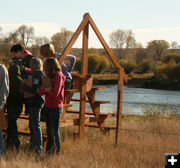
Stile
Students sit on a fence stile. Three stiles have been installed in the New Fork park which will allow visitors to cross over the barb wire fence to get over to the river for fishing access on the New Fork River and to get a closer view of where wagons crossed the river.
|

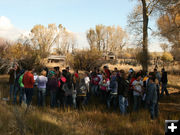
Trail ruts and homestead
Emigrant wagons drove out of the treed oasis and back onto the desert at this location, which has trail rut remnants that can be seen on the ground. Diary accounts document hundreds of wagons a day, and thousands of head of livestock crossing through this place during July and August of the mid-1800s on their way to Oregon and California. A turn-of-the-century homestead can be seen in the background beyond the park. The Sublette County Historical Society hopes to have the trails and interpretive signs done and in place to open the park to the public in the summer of 2012.
|

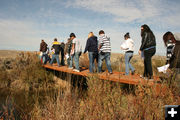
Bridge
Students return to the 21st century by crossing a canal that was put in during the homestead era, part of later use of the land along the Lander Trail. The footbridge was installed by the Wyoming Conservation Corps youth during the summer of 2011 as part of the historical park trail development. Just like the Civilian Conservation Corps provided work construction opportunities for youth in the 1930s, the WCC gives college-age youth of today a chance to gain practical experience by building bridges and trails in parks around Wyoming. The SCHS welcomes volunteers, students and adults, who would like to help in the development of this historical park.
|
